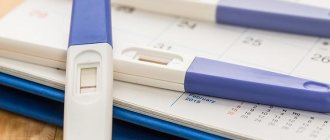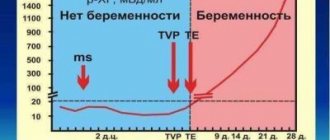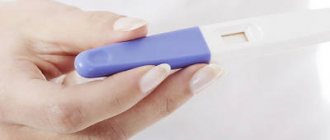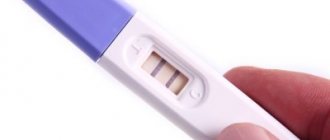When should I expect my period after unsuccessful IVF?
After the hCG analysis has shown that the implantation of the embryo has failed and pregnancy has not occurred, menstruation will begin. However, it is very difficult to say with certainty when your period will start and how long it will take. Everything will depend on the individual characteristics of the woman. All women tolerate IVF differently and, in case of failure, menstruation begins at different times for everyone. usually say that menstruation can begin within 4 days after stopping support.
If you count from the day of embryo transfer, then there are statistics according to which menstruation can start from the 4th or 11th day.
Why is there a delay?
When it became known that IVF did not work out, the woman waited for her period to start. But after they don’t come, the woman begins to think that she is pregnant if her periods don’t come. If you already know for sure that the procedure was unsuccessful, then there is no need to reassure yourself. If you let your body recover, your period will definitely begin.
Reasons for missed periods after unsuccessful IVF:
- Incorrect hormonal therapy.
- Thin endometrium. In this situation, the woman has only small spots instead of the usual discharge. In this situation, the woman usually thinks that there is no period.
- Severe emotional distress due to unsuccessful IVF. When you are stressed, cortisol is highly produced. Too high levels of cortisol disrupt hormonal levels.
- The cervical canal is blocked. It is possible that parts of the uterine wall that have been rejected have blocked the cervical canal and the discharge is not coming out.
- Inflammation in the uterus.
- Follicular puncture resulted in the formation of several corpora lutea. The corpus luteum regulates the luteal phase of the cycle.
If your period starts 4-12 days after IVF, this is normal. If menstruation begins later than this period, this indicates that a complex recovery process is taking place in the body.
First menstruation
If implantation turns out to be a success, then the periods that begin afterwards will be somewhat different from usual. After unsuccessful IVF, the nature of your periods changes slightly.
What are the most common complaints:
- nature of bleeding. First the smudge begins, then it begins to intensify. After the discharge has become abundant, clots may be present. This is exfoliated particles of the dense functional layer of the uterus;
- discomfort;
- nagging pain in the lower abdomen;
- Menstruation can last up to 2 weeks.
Be patient for 2 weeks.
All these features arose due to hormonal stimulation during the short protocol. If a woman took anticoagulants in preparation for implantation, the discharge is usually strong and bright red, almost scarlet (without clots). The second period usually occurs on time. By nature, they return to normal and do not cause serious discomfort.
It is important! If there is very heavy discharge, or if the discharge does not stop for a very long time, you should definitely consult a doctor as soon as possible.
How do birth control pills affect the body?
Birth control pills contain ethinyl estradiol and a progestin component. They begin to be taken from the first day of the menstrual cycle and set the rhythm for the entire month. A stable minimum concentration of estrogen is maintained in the blood. The pituitary gland receives a signal that there are enough hormones, so FSH synthesis is blocked. Progestins inhibit the release of luteinizing hormone, so the follicle does not ovulate and it is impossible to become pregnant.
But menstruation comes after the end of the drug package during a seven-day break . They differ in nature, duration and intensity from regular periods. With the use of contraceptives, less blood is lost and the pain that many women experience in the first days disappears. In addition to inhibiting ovulation, contraceptives have the following effects:
- thickening of cervical mucus;
- change in the functional layer of the endometrium;
- reduction of PMS symptoms;
- antiandrogenic effect of some COCs.
Normally, when using contraceptives, there should be no delay in menstruation. If this symptom is observed, you need to change the drug or completely stop using it.
The additional effects of birth control pills are used for medicinal purposes. They are prescribed for severe premenstrual syndrome, in the initial stages of endometriosis, and for mastopathy.
Irregular periods
What to do if your periods after IVF are irregular and your cycle gets disrupted? With such a deviation from the norm, the cycle may either stretch out for a longer period than usual, or become shorter with minor discharge. If this happens, it means that reproductive function is still being restored in the woman’s body. Malfunction of the reproductive system occurs due to hormonal stimulation.
The cycle is completely normalized only 60-90 days after unsuccessful IVF.
How can you normalize your periods:
- Through walking (outdoor walks) or other non-strength sports. Don't lift heavy objects.
- You cannot drink alcohol or smoke.
- You need to eat right. You can't go on a diet after unsuccessful IVF. It is at this moment that the body needs all the necessary elements for a speedy recovery.
- Drink water (at least 2 liters per day).
- Do not worry. Stress only makes it more difficult to restore hormonal levels. If you can’t cope with stress on your own, consult a doctor, he will prescribe sedatives.
- The doctor will prescribe the use of phytohormones and herbal medicines.
- Be sure to visit a gynecologist. You should be under the supervision of a doctor until your normal periods begin. Don't forget your menstrual cycle calendar.
HCG is negative, but the result is pregnancy?!
You go to take a test, everything inside shrinks, there is a lump in your throat, your hands get cold and shake, the result is negative. There are tears in my eyes, disappointment. No1 I don’t believe it, I’ll go through this again, I’ll go get an HCG test, I’m going to get the result in my soul, anxiety, fear, 1.2 tears, hysterics! No, I don’t believe it, I don’t have enough emotions! I want to go through this pain and disappointment again in this cycle, because my discharge is not the same as usual, the second time again 1.2 stress again, my period started, no, it wasn’t 5 days but only three, I’ll go and do it again HCG control in the head!!! This is me, by the way, describing my feelings. And I think I'm not the only one.
Today I received the result of hCG < 0.1, the second day of delay, the tests are negative, BT 37, my breasts are swelling, there is a feeling of moisture between my legs for the third day, as if the sea is there…………..Here is a problem for thought (((((
Hormonal imbalance is most likely, but in general up to 5 days is not considered a delay, if more than 5 days in the absence of B, then this is a reason to consult a doctor
While I was expecting pregnancy, I had delays - with always an ideal cycle - up to 7 days, and all the symptoms. But as usual, hCG is less than 0.1 and one line.
You go to take a test, everything inside shrinks, there is a lump in your throat, your hands get cold and shake, the result is negative. There are tears in my eyes, disappointment. No1 I don’t believe it, I’ll go through this again, I’ll go get an HCG test, I’m going to get the result in my soul, anxiety, fear, 1.2 tears, hysterics! No, I don’t believe it, I don’t have enough emotions! I want to go through this pain and disappointment again in this cycle, because my discharge is not the same as usual, the second time again 1.2 stress again, my period started, no, it wasn’t 5 days but only three, I’ll go and do it again HCG control in the head!!! This is me, by the way, describing my feelings. And I think I'm not the only one.
no menstruation after cesarean section causes A woman after a cesarean section often experiences abdominal pain, it can last for a long time, in this situation it is important to eliminate the cause and take timely measures to get rid of the discomfort. Doctors most often
The feeling of moisture is for M, because... in front of them are abundant watery
Source
This cannot be done if your period is late.
If your periods always start at different times, or have not yet arrived after unsuccessful IVF, you need to know what not to do.
Take a pregnancy test
After unsuccessful in vitro fertilization, if there is a delay in menstruation, you do not need to take a pregnancy test. When it is already known for sure that the embryo did not implant, the test result will become an additional cause of stress.
Align cycle
It is very important! Never try to straighten the cycle yourself. You cannot take hormonal drugs for this. Self-medication is very dangerous to health. Taking hormones is especially dangerous when hormonal imbalance has just begun.
Read more Fibroids size in weeks
Grandma's recipes
Forget about traditional recipes. Under no circumstances should such prescriptions be used to treat (eliminate) missed periods. Instead, see your doctor. The doctor will prescribe what you need and advise you on your grandmother’s recipes.
Heavy loads
It is necessary to completely eliminate heavy lifting and grueling physical activity. Do not strain the oblique and rectus abdominis muscles too much. Just walks and fresh air. You can't be stressed at work.
After unsuccessful IVF, you should abstain from sexual intercourse. The organs of the reproductive system must recover. Be patient for 2-3 months.
Cold
Try not to get sick during this difficult period for the body. Don't get too cold, dress warmly, don't stay in the cold for a long time. Don’t forget about hygiene, wash your hands often and wash your face with soap after returning from the street.
In this video, a woman doctor will tell you what to do after unsuccessful IVF:
When will ovulation resume?
| Factor | What happens in the body |
| Woman's age | It has been noticed that after 35 years the time interval lengthens and often reaches 4–6 months. This is due to some depletion of the body’s reserves, as well as concomitant pathology that appears by this age. |
| Duration of admission | If hormonal drugs are used for 2 - 3 months, the body perceives this as a kind of test. As a result, after discontinuation of the OC, something similar to its own stimulation of ovulation often occurs, and several follicles mature in the ovary at once. This property is often used by doctors for unspecified infertility or some other problem with conception in a couple. As a result, the chances of pregnancy after a short course of use increase sharply. |
A slightly different picture arises when using hormonal pills for many years. It often takes the body 6 to 12 months to fully restore its natural hormonal profile.
Taking this into account, some doctors recommend taking a break for 2 to 3 months after a year of taking it. This is not entirely convenient, which is why many women do not use these tips.
There are dozens of types of birth control pills (oral contraceptives, OK). They all contain varying levels of hormones that are released into a woman's body to prevent pregnancy. The hormones in birth control pills stop ovulation (the release of an egg from the ovary into the fallopian tube) and can affect menstruation and associated side effects.
Many aspects of menstrual bleeding may be affected, and the effect may vary over time. Your periods may become longer or shorter, irregular, heavier or lighter than before. These side effects are common with any method of hormonal contraception, especially in the first few months of use.
The standard combined oral contraceptive pill consists of both the hormones progesterone and estrogen, taken daily for three weeks, followed by a pill-free week (or placebo pills), which causes “breakthrough bleeding” due to decreased hormone levels. Although little changes in appearance (menstrual bleeding in the 1st week of a 28-day cycle), persistently high levels of progesterone and estrogen in the body of a woman taking the pill actually cancel out the normal hormonal cycle that underlies ovulation.
Side effects are more common with progesterone-based pills (called mini-pills) compared to combination pills that also contain estrogen. When taking a “monophasic” pill (contains the same dose of hormones per day), the appearance of “spotting” is more common than when using a “triphasic” pill (different doses during the cycle).
We suggest you familiarize yourself with Where to store derinat after opening
Contraceptive drugs are artificial analogues of progesterone and estrogen - female sex hormones. These drugs, taken orally, are called combined oral contraceptives, abbreviated as COCs or OCs. The purpose of these drugs is to prevent the egg from maturing and fertilizing.
During the period of using contraceptive pills, artificial rest is created for the ovaries. Their activity decreases, and the state of the endometrium in the uterus also changes - it becomes unable to accept a fertilized egg and allow it to take hold.
The duration of cycle normalization is determined by the following factors:
- the age and health status of the woman, in particular, the absence or presence of gynecological problems;
- a type of oral contraceptive;
- duration of drug use.
If a woman is young, the body rebuilds itself faster. As you age, it takes longer to adapt to hormonal changes. Slowly after discontinuation of OCs, the cycle is restored in women after 40–45 years.
If you follow all the rules for discontinuing OCs, bleeding begins 3-4 days after the last tablet. This is not true menstruation, but still a replacement. It is also called withdrawal bleeding. After this, the period for complete restoration of the natural cycle, during which the ovaries wake up, takes from 2 to 12 weeks.
A longer delay is observed with inflammatory and other pathologies of the pelvic organs and with general weakening of the body. In such cases, the cycle after stopping taking the pills can return to normal for about six months, on average within 12–16 weeks.
If a woman has finished taking OK, her periods may be irregular, heavy or scanty, and quite often there is a delay. Violation of the cycle is explained by one of the factors:
- the body goes through a recovery stage, as it is forced to produce hormones that it previously received from oral contraceptives;
- disruption of the glands - if the natural production of hormones fails, discharge may be completely absent or very intense;
- pregnancy;
- diseases of the reproductive organs;
- polycystic ovary syndrome, caused by changes in hormonal levels due to the use of contraceptives.
Brief summary
All women who decide to undergo IVF are confident that the procedure will go well and that’s right. But you should understand that the probability of a successful pregnancy is at best 50/50. Therefore, when preparing for this difficult path, a woman should know what can await her if something goes wrong, including when it comes to menstruation.
Perhaps the next in vitro fertilization procedure will be successful, especially since, according to statistics, most successful pregnancies occur the second time. Before starting the second IVF, you need to normalize menstruation, now you know how.
Don't forget to write comments, ask questions and share your experience. This article can be shared on your social networks. Rate this article using stars. Thanks for visiting.
If the fertilization procedure is unsuccessful, then after some time the woman begins menstruation. On average, from the moment the embryo is transferred to the start of bleeding, in case of failure, it takes about two weeks. The nature of your periods after IVF will be different from usual; they may be more painful and irregular. It takes several months for the cycle to normalize; if it cannot return to normal for more than six months, then you need to visit a doctor.
Sometimes IVF is unsuccessful and pregnancy does not occur, then periods should be restored
I start my period after IVF
After a woman undergoes this procedure, the situation may develop as follows:
- the onset of pregnancy;
- miscarriage;
- unsuccessful fertilization.
If the zygote fails to penetrate the endometrium of the uterus, then your period should come after a week and a half or two weeks after unsuccessful IVF.
The reasons for failures during this procedure can be different:
- endocrine disorders;
- chronic diseases;
- psychological factor;
- violations in the IVF procedure.
Sometimes the reasons for failure are purely psychological.
Since pregnancy has not occurred, the woman’s body begins the process of natural cleansing, as happens during a normal cycle. However, due to the effects of hormonal therapy, menstruation begins after unsuccessful IVF with abnormalities.
Why does the nature of menstruation change?
If menstruation begins after IVF, it is often characterized by certain features. There may be a lot of discharge and clots. Thus, the inner mucous layer of the uterus, which was not useful due to a failed pregnancy, peels off.
Clots may or may not be present, it all depends on the physiological characteristics of the woman.
Menstruation can last 10-12 days. This is necessary for the body to completely cleanse itself, since the functioning of the reproductive system was affected by artificial progesterone. Those processes that previously occurred naturally in the uterus were stimulated.
Many people experience characteristic pain in the lower abdomen
There are pulling sensations in the abdomen. This is due to spasms in the uterus, which seeks to cleanse itself of unusable endometrium. Possible deterioration in general health. Even those patients who do not experience discomfort during normal menstruation, feel pain in the abdominal area during menstruation after an unsuccessful IVF protocol. This is usually associated with psychological stress and hormonal stress on the body.
These symptoms are a consequence of the influence of hormonal therapy on the female body, as well as the result of psychological stress due to the failed opportunity to become a mother.
If during menstruation a woman experiences symptoms such as:
- Scarlet discharge. This indicates the presence of uterine bleeding, which must be stopped. Otherwise, this can lead to anemia, and in the worst case, coma.
- Increased temperature and severe pain. Indicates the presence of an inflammatory process. Perhaps pathogenic microflora was introduced due to inappropriate IVF procedures or exacerbation of chronic diseases.
- Critical days do not end. If menstruation lasts for a long time after unsuccessful IVF, then serious endocrine disorders can manifest themselves. As well as exacerbation of serious chronic diseases.
There may even be an increase in temperature
If these symptoms occur, you should immediately go to the hospital.
How long can a missed period last and what needs to be done?
Even if your periods were clockwork before you started using contraception, it may take several months for your period to even out after you stop taking the pill. And if irregular periods were the norm for you in the past, this problem is likely to return. The reliable schedule you enjoyed was only the result of hormone pills.
If your periods stop altogether, it may take several months for them to return. Gynecologists recommend allowing the body to recover on its own for 3 months after stopping birth control pills. If your periods are absent or remain irregular after this period, consult your doctor to find out the cause.
Many women think it takes a long time to conceive after they stop taking the pill, but studies show they are about as likely to get pregnant almost immediately as women who used barrier methods (such as condoms). Up to 96% of women taking birth control pills become pregnant within a year. If a delay in menstruation causes concern and suspicion in a woman, it is recommended:
- take a blood test for hCG in the clinic (determines pregnancy already on the 6-8th day after fertilization of the egg);
- take a home pregnancy test (it will help detect pregnancy only at 3-4 weeks).
Long-term use of contraceptives teaches a woman’s body to exist according to an artificial scheme. In it, the reproductive function is in a sleepy state, and the ovaries are not able to produce the required amount of hormones. In such a situation, you should not be surprised by the delay. The body will need some time to fully recover.
And for some women, after taking contraceptives, the delay continues for more than a year. In advanced cases, hormonal imbalance becomes chronic, and only a doctor can prescribe adequate treatment. Most often, you have to return to hormonal therapy, and the gynecologist can artificially induce menstruation. In such a situation, a woman needs to prepare for quite a long treatment to restore reproductive function.
Contraceptive drugs in any case cause a delay in menstruation. Whether it is a slight delay in monthly bleeding or a long period of absence, women are advised to listen to their feelings and adhere to the rules of discontinuation of contraceptives. This will help prevent the development of complications in the future, and not blame yourself for futile attempts to get pregnant.
Menstrual irregularities after taking or stopping hormonal contraceptives occur quite often.
The delay after contraceptive medications does not depend on the woman’s age; even in a young and healthy body, there is a failure of the ovulation process and other phases of the cycle.
Gynecologists assure that such a delayed situation is a natural and natural reaction of the body to a dose of hormones not planned by nature.
The main purpose of contraceptive drugs is to eliminate favorable conditions for conceiving an unplanned child. They contain a large number of so-called female hormones that affect the functioning of the ovaries. These contraceptives affect the ovulation process, slow it down or completely block it.
In addition, their action is aimed at changing the structure of the uterine mucosa and genital tract, making it thicker and more viscous. This condition of the membranes prevents the invasion of sperm into the fallopian tube. At the same time, the lining of the uterus itself becomes thinner - if the egg is fertilized, the embryo will not implant.
We invite you to familiarize yourself with Mucaltin tablets instructions for use during pregnancy
Therefore, after taking contraceptives, the delay is not surprising.
Combined contraceptives can be monophasic - the entire intake is one level of hormones, and triphasic - the set of hormones is different during the menstrual cycle. All combined products qualify for:
- Microdosed ones are prescribed to nulliparous girls who have just begun to be sexually active. Small doses of hormones in these drugs do not disrupt the menstrual cycle, taking them is not accompanied by side effects, and delay is unlikely.
- Low-dose drugs are used when, for some reason, a small dosage of hormones does not have an effect on the girl’s body.
- High-dose contraceptives are used to treat serious hormonal disorders in middle-aged and elderly women.
- Progestin tablets are a means of contraception for nursing mothers. They do not contain estrogen.
When choosing contraceptive drugs, it is important to take into account the woman’s age, the presence or absence of hormonal disorders and the fact of pregnancy and childbirth. This is required so that after taking contraceptives, the delay does not become a symptom of a serious problem with the body.
When you stop taking hormonal medications, the ovaries become more active. Due to the fact that the supply of gestagens and estrogens is stopped, the body begins to prepare for ovulation. The pituitary gland regains the ability to produce hormones that stimulate follicle maturation.
A woman may experience symptoms of contraceptive withdrawal:
- Delayed menstruation;
- frequent mood changes;
- the period of menstrual bleeding increases or decreases;
- severe pain in the lower abdomen;
- active work of the sebaceous glands.
When you stop taking contraceptive medications, the ovulation process stabilizes after 1–2 years. By this time, a woman can already plan a pregnancy and is preparing for a new addition to the family; during this entire period, minor delays in menstruation are possible.
But there are cases when pregnancy occurs immediately after stopping contraceptives. This happens due to too active activity of the ovary after prolonged stagnation. Also, successful fertilization depends on the timing of taking contraceptives.
Thus, a woman taking the drug for less than six months can quickly become a mother after discontinuation. Protection for more than 3 years significantly increases this time. Gynecologists recommend abandoning hormonal contraceptives 6 months before the desired date of conception.
This period, under favorable conditions, will be enough reproductive function for complete recovery.
The body of a healthy woman begins to function normally within 3 months after giving up contraceptives. But hormonal drugs are prescribed not only to protect against unwanted pregnancy. They are taken to treat endometriosis, fibroids, uterine bleeding and other diseases. In such a situation, it is impossible to completely abandon contraceptive drugs until recovery.
By adhering to only three rules for canceling contraceptives, a woman ensures a minimal reaction of the body and eliminates delay:
- The end of taking medications should be agreed with the attending physician after a thorough examination and analysis.
- The cycle should be completed before stopping;
- Abrupt refusal of hormonal drugs is prohibited. A special dosage reduction regimen prepared by a doctor is required.
Also, you should not switch to other types of birth control pills on your own. It is impossible to predict how the body will react to this change. Therefore, your doctor will help determine the correct choice of means and actions during the transition. And it is very important to choose the same specialist who prescribed previous contraceptives.
A woman should understand that interrupting the course of taking the drug is fraught with serious consequences for her health. Such as:
- Menstrual disorder;
- heavy uterine bleeding;
- unplanned pregnancy.
You must take all the pills from the pack according to the prescribed schedule and wait until your period begins. After its completion, another week must pass before it is safe to take the new drug.
A normal occurrence is a delay in menstruation when you stop taking contraceptives.
When a delay occurs for several days after taking contraceptives, then the body begins to feel a lack of artificial hormones.
In such a situation, he has to remember the mechanism for independently producing them. This process can take a long time - the ovaries are used to being in an inhibited state.
Long-term use of the combined drug Yarina causes ovarian hyperinhibition syndrome. In this condition, the woman’s gonadotropic function of the pituitary gland is blocked. This phenomenon is reversible and after a period of time, periods will appear again.
The composition of Klayra is significantly close to the natural hormones of the human body. After taking the drug, side effects occur in very rare cases.
If after cancellation there is a delay in menstruation, then the woman should be patient. After taking contraceptives, the delay will pass by the next menstrual cycle, and spotting will appear according to the timing.
But they may be more abundant than usual. There is no need to be alarmed; in 2–3 months the situation will stabilize.
This monophasic contraceptive includes categories of tablets with two different actions. The first (pink) contains hormones to prevent unplanned pregnancy, the second is a pacifier.
Jess's intake is designed according to a specific pattern that cannot be violated. If after discontinuation of the drug there is a delay in menstruation, then you can safely go to the gynecologist to confirm pregnancy.
The fact is that missing even one real pill can lead to conception.
What are the reasons for delay after IVF
If there are no periods after unsuccessful IVF, this may be the result of the following reasons:
- Nervous overstrain. After unsuccessful IVF, menstruation does not come, the woman feels psychologically depressed, her plans to become a mother were not fulfilled. Nervous stress can destabilize hormonal levels and provoke a delay in the next menstruation and scanty periods after IVF.
- Incorrect treatment. Sometimes it happens that hormonal therapy for a successful IVF procedure was chosen incorrectly for the patient. If, according to the test results, hCG is negative, but there is no menstruation after IVF, then this indicates various malfunctions in the endocrine system, which destabilize the cycle and delay menstruation.
- Small thickness of the endometrium. It can also occur due to incorrectly selected hormonal therapy. As a result, the lining of the uterus grows incorrectly, it is thin and the uterus takes more time to prepare for cleansing. This fact may be one of the main reasons for severe abdominal pain during menstruation.
- Blockage of the cervical canal by the endometrium. Sometimes the endometrium in the uterus does not come off piece by piece, but immediately in large layers. This can cause blockage of the opening in the cervix for mucous tissue to exit and the onset of menstruation after IVF.
- Inflammatory processes in the uterine cavity. If there are no periods after IVF, this may indicate an exacerbation of chronic diseases in the uterine cavity, for example, endometritis, endometriosis, colpitis, etc.
Read more Unpleasant vaginal odor before menstruation
If you haven’t had your period for a long time, see a doctor, there may be inflammation
Common reasons for missed periods after an unsuccessful IVF attempt are listed in the table.
| Frequency of occurrence in patients, % | Reasons for delay | |||
| Nervous overstrain | Incorrect treatment | Inflammatory processes | Blockage of the cervical canal of the uterus | |
| 71 | 21 | 30 | 12 | |
Causes of thrush after transfer
There are several assumptions about the causes of thrush after embryo transfer. Hormonal therapy carried out to stimulate ovulation affects the condition of the entire body. This can trigger the development of candidiasis. Another cause of thrush is preliminary antibacterial therapy. In some cases, it is prescribed to prevent a bacterial infection.
Candidiasis negatively affects the condition of the fetus. The disease increases the tone of the uterus. This disrupts the supply of nutrients to the fetus. As a result, the risk of embryo development pathology increases.
How to normalize a cycle
To speed up the body’s recovery after this procedure, you must adhere to the following rules:
You can understand that the in vitro fertilization procedure was unsuccessful by a negative pregnancy test or hCG test. They are recommended to be done 14 days after the introduction of fertilized oocytes into the uterus, provided that menstruation has not begun after IVF. But the timing of the appearance of menstrual flow in women varies, and after hormonal therapy, disruptions may occur.
How to determine pregnancy after embryo transfer before delay
After a difficult ordeal - IVF or other methods of assisted reproductive technologies - each patient tries to catch at least some signs that she is pregnant. Girls painstakingly look for positive signs in themselves after embryo transfer. A combination of new sensations, emotional experiences and her own intuition help a woman anticipate a new situation - pregnancy.
Can a woman feel successful implantation after IVF?
The first signs of pregnancy after IVF, according to many representatives of the fairer sex, can be detected within a day after embryo transfer. However, such sensations and assumptions do not have a clear medical explanation. Therefore, you cannot blindly trust them. Doctors suggest that oddities in well-being are associated with the transfer procedure itself and do not at all mean successful implantation.
In addition, during this period the patient undergoes serious hormonal therapy, which can also affect her health and provoke the appearance of unusual symptoms. There is only one logical explanation for the first signs of pregnancy after embryo transfer: the symptoms may be residual after the hCG injection. Typically, women are concerned about pain, changes in the condition of the mammary glands, strange discharge, malaise, nausea and fever.
The condition after cryotransfer in women is almost the same as in a conventional IVF protocol; there are no fundamental differences. The patient’s well-being depends on individual health indicators and tolerability of medications used after landing. To understand whether a woman can feel conception has taken place, it is necessary to know what is happening in her body during the two weeks before taking a pregnancy test:
Day 3 – maybe slightly
Source
From what day of the cycle does the IVF protocol begin?
Depending on the state of the woman’s reproductive health and the functioning of the ovaries, IVF is recommended by the doctor using a long or short protocol. These options differ in the duration of the implementation.
The long protocol lasts about 40 days. On days 21-22 of the menstrual cycle, the patient is prescribed drugs that suppress the process of hormone production, the ovaries are switched off. The doctor has the opportunity to achieve synchronous growth of follicles and obtain eggs of the same quality. Stimulation begins 2-4 days after the start of menstruation.
The short protocol is used more often and is prescribed to patients with a reduced egg supply. On days 2-4 of the beginning of the cycle, the woman is stimulated to superovulate. On days 5-6, GnRH antagonists are added to prevent premature release of the egg.
The stimulation date for patients in IVF clinics is set in advance. But there is no need to panic if there is a delay in menstruation before the IVF protocol. If the reason for the failure is not pregnancy, then you should re-register for another day.
On what day of the cycle is IVF done?
The date of the procedure is set on days 12-15 of the cycle. At least 10 days must pass from the start of stimulation. But the exact date is selected individually depending on how the ovaries react to the drugs. Every 2-3 cycles, ultrasound monitoring is required; the examination allows you to monitor the growth of follicles.
36 hours before the scheduled date of egg retrieval, the woman is given an hCG injection. After this, mature oocytes are removed from the ovaries under ultrasound control. They are combined with sperm in a test tube and grown in a nutrient medium under the supervision of reproductive doctors until 3 or 5 days of age. The doctor selects the strongest embryos from the fertilized eggs obtained. Of these, 1-2 are placed in the uterus, and the rest are frozen at the woman’s request.
Menstruation after IVF and pregnancy
If a woman has a negative pregnancy test 2 weeks after the blastocyst is transferred into the uterus, then her period should begin soon.
Menstruation after IVF before hCG
Sometimes patients are faced with a situation in which, after IVF, menstruation comes earlier than the result of the hCG test. The appearance of bleeding after fertilization does not always indicate failure.
If blood from the genital tract begins to be released 3-8 days after transplantation, then there is a possibility that this is implantation bleeding. In such a situation, the discharge should be scanty, the permissible duration is 1-2 days.
If, after an unsuccessful IVF attempt, your periods begin 10 days later, they are heavy, and last more than 3 days, then IVF was unsuccessful. In cases where menstruation occurs for more than 10 days in a row, you should see a doctor. To normalize the condition, the doctor may prescribe hemostatic agents.
HCG after IVF is positive, menstruation is coming
The most alarming situation is when a woman begins her period after IVF, but a pregnancy test or hCG test before showed a positive result. In this case, it is advisable to get tested and look at the dynamics of growth in hormone levels and compliance with the timing of development.
If the hormone concentration increases, then maintenance therapy is prescribed to maintain pregnancy. It happens that the patient’s hCG level has decreased or its concentration is less than expected. Possible reasons include the following:
- remnants of the hCG injection that was given before the puncture of the eggs;
- the embryo attached but stopped developing.
The tactics of further actions are determined by the attending physician individually.
After IVF, hCG is negative, but no periods
In cases where the hCG level on the 14th day after the transfer is less than 5 units, and menstruation does not begin, it means that a malfunction has occurred in the body. Doctors recommend stopping taking pills that are used to maintain pregnancy and waiting for menstruation.
How to cancel OK
In order not to cause hormonal disruptions in the body and not cause discomfort to yourself, you should properly stop taking oral contraceptives.
There are several termination options. Option 1. The most optimal solution is to stop taking the pills at the moment when you are about to start a new pack. In other words, take all 24 or 28, after which, as usual, spotting of various types will soon appear. In the new cycle, the ovaries themselves will respond to signals from the pituitary gland and hypothalamus of the brain, which, through FSH and LH, will stimulate their own production of sex hormones.
Option 2. Sometimes it becomes necessary to stop taking oral contraceptives at some point that does not coincide with the end of taking the entire package. There is nothing critical about this, but each organism can perceive this option differently. Therefore, you can stop taking any pill.
Such daubing can last up to 10 - 14 days; this should not cause the woman to worry. Seek medical help only if the discharge is very heavy or prolonged.
But the ideal option is when the doctor, after examining and assessing all the risks, recommends the most optimal regimen in a particular situation. After all, oral contraceptives are often prescribed not only for the purpose of preventing pregnancy, but also for the treatment of various pathological conditions. It is difficult to predict what kind of menstruation a woman will have after stopping ok, since these are the individual properties of the body to restore its functions.
The effect of oral contraceptives
Most medical experts and doctors suggest not stopping birth control mid-cycle. Instead, it is recommended to finish the current packaging and not start a new one. This helps the body more easily return to its normal cycle. Also, if you stop taking birth control pills mid-cycle, you may experience cramping and spotting as early as two days after your last pill. Hormones obtained from the tablets are eliminated within two days. The body then tries to restore the natural menstrual cycle.
The absence of menstruation after stopping the OC should not cause immediate concern in a woman, since it is a variant of the norm. However, in some cases, this may indicate pregnancy, so a home pregnancy test or a blood test for hCG in a clinic is what will help clarify the situation.
Contraceptive drugs help a woman protect herself from unwanted pregnancy. A natural method of contraception or interrupted sexual intercourse has a low percentage of guarantee. Therefore, many women use medications that protect them from pregnancy. They have a hormonal composition and sometimes have a negative effect on the body. Why do I not have periods after stopping birth control?
In such situations, you need to be prepared for the fact that scanty “periods” will begin in a day or two after stopping the OC. Less often, the discharge is abundant or absent at all. This is how the body reacts to a sharp drop in the level of sex hormones.
Menstruation after follicular puncture without transfer
Patients are not always sent for IVF immediately after oocyte collection. Even without the fertilization procedure, there is a risk of disruptions; the regularity of menstruation may be disrupted.
The state of health during menstruation after follicular puncture may worsen; women complain of the following symptoms:
- pain that is not relieved by taking painkillers;
- decreased blood pressure;
- hyperthermia;
- the appearance of vaginal discharge with an unpleasant odor;
- vomit.
If a woman feels unwell during her period after a puncture, and the pain goes away after taking non-steroidal anti-inflammatory drugs, then there is no cause for concern. A slight deterioration in well-being may be due to the body’s reaction to the intervention.
How long after puncture does menstruation begin?
Normally, after oocyte collection, menstruation should begin 10-14 days later. Mechanical collection of follicles is a replacement for ovulation, which should occur. After the procedure, phase 2 begins. Its duration should not differ from the standard one.
Delayed menstruation after follicular puncture
Before egg retrieval, the woman is prescribed medications to stimulate the ovaries. Under their influence, several eggs mature in them. In place of each of them, a corpus luteum is formed, synthesizing the hormone progesterone. Due to its increased amount in the body, the duration of phase 2 may be extended. A delay of 5-7 days is considered acceptable.
Read more Transparent discharge with a yellowish tint
If there is no menstruation for more than a week, then you need to see a doctor. There is a risk of cystic formations on the ovaries or hormonal imbalance. In cases where IVF is not planned after the puncture, hormonal contraceptives may be prescribed to prevent problems.
What periods will come
In most cases, in the first one to two months after finishing a course of oral contraceptives, menstruation comes with minimal deviations. But sometimes all the hated symptoms return at once.
Therefore, after stopping hormonal pills, especially if they were once prescribed for therapeutic purposes, you should be prepared for the return of previous unpleasant signs and conditions during the cycle.
Most often, painful periods reappear after stopping OCs, if they were like that before starting to use contraceptives. Therefore, it is better to immediately buy tablets that alleviate this condition - non-steroidal anti-inflammatory, antispasmodic drugs, etc.
In most cases, obvious symptoms of premenstrual syndrome return 2 to 3 months after discontinuation. Most often these are headaches, sudden changes in mood, irritability, engorgement of the mammary glands, etc.
After stopping OK, heavy periods will not come earlier than in a month or two. And this takes into account the fact that almost always, when using hormonal pills, the amount of discharge decreases significantly, and sometimes it’s just a blur for several days. If, while using contraceptives, menstruation still remained heavy, then after their discontinuation you can expect some increase.
If for some reason a woman decides to stop taking it without finishing the package she started, then most often brown periods appear a few days after stopping the OC. In 90% of cases they are of an unusual nature: not numerous, last up to 14 days, painless, etc. It’s not entirely correct to call something like this menstruation; it fits more into the gradation of “withdrawal syndrome” and the body’s reaction to sudden changes in the level of hormones in the blood.
When does your period start after failed IVF?
After introducing fertilized eggs into the uterus, doctors recommend waiting up to 2 weeks. If after the specified period your period does not begin, you can do a hCG test. It is more informative compared to a pregnancy test.
After a failed attempt at transferring blastocysts during IVF, periods can begin within 9-10 days. But some patients may experience disturbances in the regularity of their cycle.
First period after unsuccessful IVF
After unsuccessful IVF, the first menstruation may begin within a week. But some people experience delays due to stress.
After IVF, women are prescribed synthetic progesterone. Duphaston or Utrozhestan are most often used; under their influence, the likelihood of implantation of a fertilized egg increases. But if on the 14th day the hCG test shows a negative result, then it is necessary to stop taking progesterone. After this, your period usually comes after 2-3 days.
Second period after unsuccessful IVF
By the beginning of the 2nd menstrual cycle, the woman’s condition should normalize. If you get your period within 14 days after IVF, then there should be no delays in the next month. But in some patients, as a result of ovarian hyperstimulation, menstruation becomes irregular. After unsuccessful IVF, the second cycle of menstruation may begin earlier, but most women experience delays.
Complications of IVF
The IVF process is often the only opportunity for a woman to experience maternal happiness. However, only 40% of this procedure has a happy ending.
It is not always the case that conception will allow a woman to safely carry and give birth to a baby.
The most common and main complications after artificial insemination can be:
- Ectopic pregnancy: occurs in 2-3% of cases. In case of such a complication, surgical removal of the fertilized egg along with the tube is necessary. Otherwise, the pipe will rupture, putting the woman’s life at risk.
- Frozen pregnancy. In this case, the embryo stops developing, and the woman has to scrape out the fertilized egg. Pathology also occurs during natural conception. However, with artificial insemination, this pathology can occur much more often and repeatedly.
- Hyperstimulation syndrome during pregnancy. This pathology is associated with cyclic disorders after embryo transfer. At the same time, it is difficult for a woman to determine with what regularity her periods come. For several months after unsuccessful IVF, the cycle remains irregular, and the nature of the discharge changes noticeably (abundance, duration, etc.) All this is connected with the hormonal effect on the body during the IVF procedure. Sometimes medications are used to restore a normal cycle.
Periods after IVF are very common. And there is no need to panic. Perhaps this is how the body reacts to a developed pregnancy. If pregnancy has not yet occurred, then there are still many chances to conceive a baby, and you should not give up prematurely. Happy motherhood to you!
The nature of menstruation after an unsuccessful IVF protocol
In cases where after IVF the patient began menstruation but did not become pregnant, she should be aware that the nature of the discharge may change. This is due to the influence of drugs that are used to activate the ovaries.
Stimulation, which is carried out in the second phase of the cycle during IVF, also affects the nature of menstruation. Progesterone helps the endometrium begin to actively grow.
How long does your period last after unsuccessful IVF?
The duration of critical days in patients after failed in vitro fertilization should not differ from the standard. If your period continues for more than 7 days in a row, then you need to do an ultrasound and figure out the reasons for the increase in the duration of the discharge.
Uterine bleeding may resemble heavy periods that are prolonged. When it opens, hemostatic drug therapy or therapeutic and diagnostic curettage is necessary.
Heavy periods after IVF
Patients after an unsuccessful IVF protocol may have heavy periods. An increase in the volume of discharge may be due to the use of drugs, under the influence of which the endometrium grows more intensely and thickens. Under the influence of progesterone, new blood vessels are formed in the mucous layer.
When menstruation begins, the endometrium is shed and the resulting vessels burst. Because of this, periods become more intense. But by cycle 2-3, the volume of discharge normalizes.
After unsuccessful IVF, periods come in clots
The appearance of clots in patients who have experienced an unsuccessful IVF attempt is considered normal. This is how the endometrium, which has grown under the influence of stimulant drugs, leaves the uterus. At the beginning of menstruation, the mucous layer may not separate evenly, but in fragments. Because of this, a woman may see large clots on the pad.
Scanty periods after IVF
If light menstrual-like discharge appears on days 3-5 after the introduction of embryos, do not immediately stop progesterone. If their volume has decreased or they have completely stopped after 1-2 days, then it is advisable to take hCG on days 12-14.
If pregnancy does not occur, then the appearance of scanty periods after unsuccessful IVF is also considered a variant of the norm. It is allowed to reduce the duration of discharge and reduce its volume. This is how the body can react to the hormonal agents used in the protocol.
Painful periods after IVF
Often, after a failed transplant, patients complain of increased pain during menstruation. Deterioration in health may be due to an increase in endometrial volume.
Increased sensations may also be due to the fact that under the influence of hormones the endometrium is more firmly attached to the muscle layer and more intensively grows blood vessels. The process of exfoliation is more difficult; to remove the mucous layer, the uterus has to contract intensively.
Long periods after IVF
An increase in the duration of menstruation may be due to the effect of hormonal drugs that are prescribed to the patient in the protocol.
Delayed periods after IVF
When a delay occurs, women expect that the protocol was successful and pregnancy has occurred. But it is better to donate blood to determine the concentration of hCG. Only by the results of the analysis can one say for sure whether a fertilized egg has implanted in the uterus.
After unsuccessful IVF, the resulting delay in menstruation may be due to hormonal imbalance. If menstruation does not occur even 3-5 days after stopping progesterone, then the patient is prescribed therapy to induce menstruation.
Reasons why there is no menstruation
When starting to take birth control pills, women often experience certain changes in their bodies, such as periodic nausea or breast tenderness.
It is logical that your health may change after you stop using oral contraceptives.
Any type of hormonal contraception can affect the menstrual cycle, including for several months after stopping the drug.
A common reason why there are no periods after stopping birth control is pregnancy. Fertilization occurs for a number of reasons:
- non-compliance with the regimen of taking pills (missed a day or different times of taking);
- hormonal disbalance;
- taking antibiotics;
- bad habits (alcohol, smoking).
If the test result is negative, then the reasons why there are no periods after birth control pills may be different. Most often this is due to the functioning of the reproductive system. When canceling contraceptives, cycle disruption is an acceptable norm. The body needs time to restore the functions of the pituitary gland so that all hormones are produced in the right quantities and on time, which is why there is a delay.
However, if contraceptives were taken for a short time, then restoration of the uterus and ovaries (regular menstrual period with ovulation, formation of the corpus luteum and proliferation of the endometrium) occurs within 1–3 months.
If menstruation does not begin for several months, then this is an alarming signal about other disorders occurring in the body. This will require a full examination, not only of the reproductive system, but also of the thyroid gland, which is responsible for the production of hormones.
A delay in menstruation after stopping OCs often confuses women. Such violations can appear due to various reasons. There are several main ones.
Pregnancy
Once birth control is stopped, the risk of pregnancy increases dramatically. Especially if the course of taking pills was only a few months. Therefore, the first thing that needs to be ruled out if there is a delay is pregnancy. You can do a regular urine test, but it is better to take a blood test for hCG. The latter has 100% reliability already on the tenth day after the expected conception.
We invite you to familiarize yourself with Flemoxin solutab tablets for children
Cycle disruption
If a woman stops using the pills abruptly, without finishing the pack, then she may not count the short periods after stopping the pill as menstruation. Indeed, in most cases they are of a smearing nature. Then, when calculating the cycle, it turns out that its duration will be about 40 - 50 days. It is correct to consider the day of the appearance of any spotting after discontinuation of contraceptives as the first of the new cycle.
It is also necessary to consider whether the girl has had menstrual irregularities before. If hormonal drugs were prescribed to restore the cycle, then immediately after discontinuation the disruptions may continue. At first these are usually minor delays, which can turn into longer ones.
In women after 35 years of age, cycle recovery does not occur as quickly as in 25-year-olds, for example. Especially if oral contraceptives were taken for more than 3 to 5 years without interruption.
Sexual infections
Using the hormonal method of contraception allows you to avoid only unwanted pregnancy, but sexually transmitted infections are not prevented in this way. Even a minor inflammatory process can ultimately lead to ovarian dysfunction, which will manifest itself as a violation of the cycle after stopping taking the pills.
In any case, if there are no periods after stopping the OC, you should consult a specialist. Only a doctor, after further examination, can find out the true cause of the delay and prescribe the necessary treatment.
Possible complications
The maximum likelihood of complications occurs at the stage of ovarian stimulation. With hyperstimulation, the ovaries increase in size, and the woman feels pain in the lower abdomen, a feeling of fullness. There is also a risk of rare complications such as rupture of the follicle before puncture or twisting of the ovarian pedicle.
Some women experience side effects from taking medications prescribed in the IVF protocol. In patients with weakened immune systems, there is a risk of developing infectious complications after puncture; an inflammatory focus may form at the puncture site.
After the fertilization procedure, the regularity of the cycle may be disrupted. Among the causes of failure are the formation of luteal cysts or hormonal imbalance.
Post Views: 30









